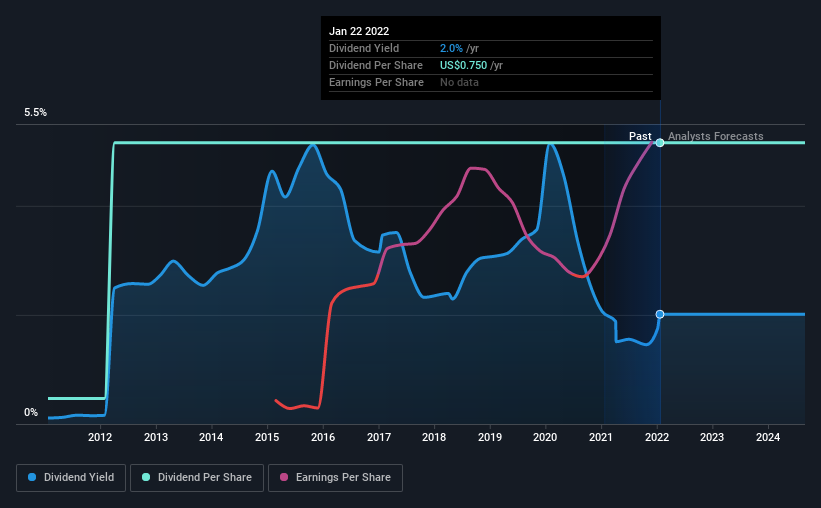Here's What We Like About Schnitzer Steel Industries' (NASDAQ:SCHN) Upcoming Dividend
Readers hoping to buy Schnitzer Steel Industries, Inc. (NASDAQ:SCHN) for its dividend will need to make their move shortly, as the stock is about to trade ex-dividend. The ex-dividend date occurs one day before the record date which is the day on which shareholders need to be on the company's books in order to receive a dividend. The ex-dividend date is important as the process of settlement involves two full business days. So if you miss that date, you would not show up on the company's books on the record date. Accordingly, Schnitzer Steel Industries investors that purchase the stock on or after the 28th of January will not receive the dividend, which will be paid on the 14th of February.
The company's next dividend payment will be US$0.19 per share. Last year, in total, the company distributed US$0.75 to shareholders. Looking at the last 12 months of distributions, Schnitzer Steel Industries has a trailing yield of approximately 2.0% on its current stock price of $37.27. Dividends are a major contributor to investment returns for long term holders, but only if the dividend continues to be paid. That's why we should always check whether the dividend payments appear sustainable, and if the company is growing.
View our latest analysis for Schnitzer Steel Industries
Dividends are typically paid out of company income, so if a company pays out more than it earned, its dividend is usually at a higher risk of being cut. Schnitzer Steel Industries has a low and conservative payout ratio of just 11% of its income after tax. Yet cash flows are even more important than profits for assessing a dividend, so we need to see if the company generated enough cash to pay its distribution. Dividends consumed 58% of the company's free cash flow last year, which is within a normal range for most dividend-paying organisations.
It's positive to see that Schnitzer Steel Industries's dividend is covered by both profits and cash flow, since this is generally a sign that the dividend is sustainable, and a lower payout ratio usually suggests a greater margin of safety before the dividend gets cut.
Click here to see the company's payout ratio, plus analyst estimates of its future dividends.
Have Earnings And Dividends Been Growing?
Companies with consistently growing earnings per share generally make the best dividend stocks, as they usually find it easier to grow dividends per share. If earnings decline and the company is forced to cut its dividend, investors could watch the value of their investment go up in smoke. Fortunately for readers, Schnitzer Steel Industries's earnings per share have been growing at 14% a year for the past five years. Schnitzer Steel Industries has an average payout ratio which suggests a balance between growing earnings and rewarding shareholders. This is a reasonable combination that could hint at some further dividend increases in the future.
Another key way to measure a company's dividend prospects is by measuring its historical rate of dividend growth. Schnitzer Steel Industries has delivered an average of 27% per year annual increase in its dividend, based on the past 10 years of dividend payments. It's great to see earnings per share growing rapidly over several years, and dividends per share growing right along with it.
Final Takeaway
Is Schnitzer Steel Industries worth buying for its dividend? Earnings per share have grown at a nice rate in recent times and over the last year, Schnitzer Steel Industries paid out less than half its earnings and a bit over half its free cash flow. Overall we think this is an attractive combination and worthy of further research.
On that note, you'll want to research what risks Schnitzer Steel Industries is facing. For instance, we've identified 3 warning signs for Schnitzer Steel Industries (1 is potentially serious) you should be aware of.
A common investment mistake is buying the first interesting stock you see. Here you can find a list of promising dividend stocks with a greater than 2% yield and an upcoming dividend.
Have feedback on this article? Concerned about the content? Get in touch with us directly. Alternatively, email editorial-team (at) simplywallst.com.
This article by Simply Wall St is general in nature. We provide commentary based on historical data and analyst forecasts only using an unbiased methodology and our articles are not intended to be financial advice. It does not constitute a recommendation to buy or sell any stock, and does not take account of your objectives, or your financial situation. We aim to bring you long-term focused analysis driven by fundamental data. Note that our analysis may not factor in the latest price-sensitive company announcements or qualitative material. Simply Wall St has no position in any stocks mentioned.

